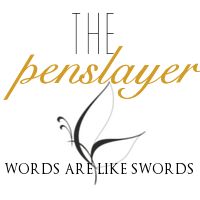 | |
| {source} |
the seventh day - your favourite genre to write
Someone asked me about this not too long ago, and I realized I really didn't know. Any one sample of my writing at any given time would probably fall sloppily in between two or three genres. I wrote one story that would belong mostly in the genre of fantasy, but that was far from my favourite. To remedy this - and to be able to give an answer to this question - I have coined my own genre: what I [would] like to read.
That may seem rather self-centred, but I think most authors follow that rule. I write what I admire most in a book: the ability to be fantastical without being strictly fantasy. That is, rather than saying "This all took place in a world called Idle Mirth in the Kingdom of Ethelfrythwyrdd where the good king Elbordir of Ethelfrythwyrdd ruled..." That would be closer to strict fantasy, and also largely a rip-off. As mentioned, I have dabbled in a little of that (the fantasy, hopefully not the ripping-off), but the fantastical is more to my taste.
It is difficult to describe the fantastical, but I'll try to summarize it as I see it in my own writing. As far as I can tell, it involves taking relatively modernish settings and intertwining them with the ideas (if not the literal figures) of the fantasy novel: heroes and monsters, kings and peasants, bards and jesters. Sometimes this comes complete with the swashbuckling duels; other times it carries the almost jarring note of the modern, tedious business of pulling out a gun and plugging someone.
Of course, even with the loose boundaries of fantastical to work within, things tend to seep across the boundaries into other realms. My current full-blown work-in-progress blends the swashbuckling with the tedious, but it also behaves as if it is a mystery novel. So you see, the old question of genres is still not an easy one to answer. But I think it is safe to say that when I write, the element I am striving for most of all is that element of the fantastical, the fairy-tale, the moderately unbelievable. If there are not dragons, there are the sort of characters that would be educated enough (having read the right sort of books) to know what to do if there were, and brave enough to venture to do the same. Chesterton advocated the necessity of the fairy tale in the ordinary; I should like to do that, though not as directly.




*sagenods* That is an excellent way to put it.
You're doing exactly what Lewis and Tolkien did (not in writing style but in concept). There's a lovely quote in the Notion Club Papers (which unfortunately I don't have) that Lewis and Tolkien were talking once and decided that there were not enough books around of the kind they wanted to read. And so they concluded that they would write them. We know about their fantasy works, but they also wanted more Sci-Fi of Jules Verne's style. So they somehow decided that Lewis would write of space travel and Tolkien of time travel. Lewis succeeded, but unfortunately Tolkien did not (and even Lewis' attempted time travel adventure was abandoned).
But my point is that writing what you want is a good idea. You may find, like these two, that others also want to read that kind of stuff, resulting in a famous work ;-)
Ajjie >'.'<